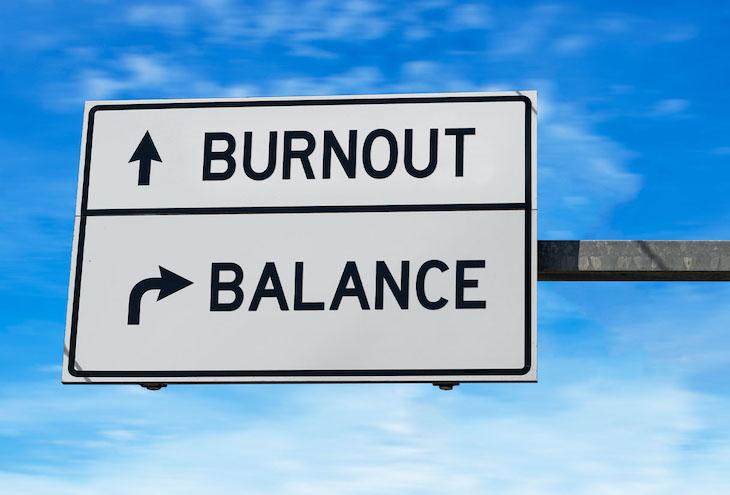Traditional aspects of how and where we work have shifted over the past two years. The remote and hybrid work schedules can make it much harder to separate professional and personal lives. As a result, you may feel like you’re never able to get away from work. You may find yourself becoming more negative or cynical, feeling tired, and lacking motivation to get your work done. Don’t assume these are normal feelings. You might be experiencing burnout. Here are five signs that you’re burned out — and what to do about it.
You’re Exhausted
We’ve all been exhausted at various times. The stress and anxiety brought on by the pandemic have affected everyone. But when the exhaustion is constant, it may actually be a sign of burnout.
The exhaustion may be mental, emotional, physical, or a combination of the three. You may have trouble sleeping, or perhaps you’re getting enough sleep but it doesn’t make a difference in your energy level. Or the tasks that once seemed easy now take much more effort to complete. These feelings of exhaustion can be signs of burnout.
So how can you fix it? In some cases, you may need to get more rest. Prioritize good sleep, which means at least six solid hours per night. If you feel like you’re getting enough sleep, start thinking about how you can remove or reduce some of the demands that are draining your energy.
You’re More Negative
Another indicator of burnout is your disposition. Were you happy and upbeat but now seem more cynical and negative? Do you find yourself seeing the bad in every situation or griping about every little thing at work? You may also feel like what you’re working on doesn’t matter. These could be signs that you’re burned out, or on your way there.
In order to combat these feelings, you need to first understand when they are out of character for you. Pay attention to how and what you feel, and if you find that these feelings are not in line with your typical character, take steps to address them. Participate in activities that you enjoy, either alone or with family and friends. Make time for things that make you happy and can help elevate your mood. By adding more happiness into your life, you’ll have less room for negative feelings.
You’re Unmotivated
We hope that during our professional careers we have the desire and drive to perform our duties each day. There will be days when we don’t, but those should be the exception. If you find it’s becoming your norm to feel uninspired and unmotivated, you may be burned out.
In order to get back to that productive place, step away from your work. Take some time to focus on what you enjoy and consider whether you can find those things in your current role. If not, determine whether they exist at your current company or if it's time to move on. The pandemic has opened up a world of opportunities and has helped many people realize their passions and pursue their dreams. It may be time to pursue yours and regain your motivation.
You’re Not Performing as Well as You Could Be
Many of us pride ourselves on being able to work at the highest level. But you may find that you’re not performing at your highest level anymore. If you compare your job performance now to a year or two ago, would you say you’re performing at the same level? If your performance is lower, this could be another sign of burnout.
If that’s the case, take a look at your work life balance. Is your work influencing or encroaching on your personal time? Do you find yourself mulling over problems or situations when you’re not working? If the answer is yes, take a step back and create better boundaries between your work and your personal life. Allowing work to invade your personal life means that you never really get a break from it. As a result, you never have a chance to truly unplug and recharge. Remember, work should be dealt with during work time and your personal time is for you to focus on yourself and your family.
You’re Not Taking Care of Yourself
Many people who are burned out find that their health suffers — both mentally and physically. You may stop exercising, eating well, and taking time for yourself. All can be signs of burnout, and if they go on for too long, there can be serious consequences.
Take time to exercise, even if it’s just 10 minutes a day. Try to encourage good nutrition and eating habits, even if you’re not successful all of the time. Give yourself space to just relax, meditate, read, or do anything that helps calm you. Make your mental and physical health a priority, and you will see a positive difference.
Being burned out can happen to anyone, at any time. Know what signs to look for. Don’t ignore these signs or feel defeated if you realize you are burned out. Take small, constructive steps to move in the opposite direction, and you will get to a place where you are happy, healthy, and excited to get to work.
 On Topic
On Topic
Montoya Whiteman, Cheyenne and Arapaho, is the senior director of marketing at AISES. In this creative role, she leads multifaceted marketing operations with the broad goal of forwarding the AISES mission by impacting STEM education and workforce development. Her skills and professional experience have proven important for successful communications, networking, community building, management, and leadership.
How do you recognize and counteract burnout?
We are all busy professionals who are continually challenged with achieving a work-life balance. When the demands of work and family get overwhelming, it can lead to burnout. If not recognized and treated, burnout can have negative effects. Therefore, it is important to recognize the signs of burnout so you can better handle anything that comes your way.
As a working professional, I have experienced burnout. Steps I take to counteract burnout begin by taking assessment of the stressors that are causing me to feel burned out. It may involve taking a break from a project, managing conflicting responsibilities, reducing my workload, delegating tasks to others, or simply saying “no” to new tasks. It essentially means drawing better boundaries, which is the first step toward making change.
Other key signs of burnout are physical and emotional exhaustion. Fatigue is a major symptom of burnout that can touch all aspects of your life. We are living in especially emotional times, which makes burnout prevalent. Be vigilant of your mental health by talking with a peer, mentor, or mental health practitioner — someone who is not a family member. Build a support system of professionals who can provide useful strategies. Peers are often receptive to discussing how they overcame burnout based on their own struggles and experiences. The key is getting the help you need to avoid negative outcomes. Set a path in the right direction for your optimum wellbeing. You can do it!
Ignoring or not addressing burnout can have significant consequences. Take care of yourself physically — take breaks from the computer, drink plenty of water, go outside for fresh air, or walk. These simple strategies boost brain function, reset your attitude, and can help you deal with stress. Other beneficial activities include shutting off the phone, reading a book, engaging in a hobby, and exercising. Set good sleep and eating habits to support your mental and physical health. Look for the signs and cues that help you to relax.
It is increasingly clear that people are dealing with mounting stress that can lead to burnout. Today, there are tools and resources, including self-help books and blogs, to recognize and manage stress, exhaustion, and burnout. A place to start is being honest with yourself. Understand your needs, limits, and emotions. My own self-talk is you don’t have to go through this alone.
Burnout is common. As soon as you recognize burnout, take action to end the stress cycle. Take the time to reflect on your current situation, explore possibilities, and make an action plan on how to move forward. Explore and prioritize self-care — listen to yourself and your heart.














